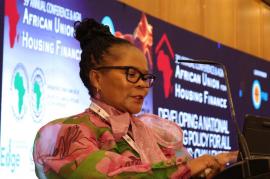
Human Settlements Deputy Minister, Pam Tshwete, says government is finalising the establishment of a Human Settlements Development Bank (HSDB) through a legislative framework.
Addressing the African Union for Housing Finance 39th annual conference currently underway in Windhoek, Namibia, Tshwete said the HSDB will be catalytic in bringing in private sector funding to deliver a range of credit-linked products and instruments through risk mitigating solutions.
“Our strategic intent towards stimulating the functioning of the affordable housing market and scalability of human settlements delivery is supported by the setting-up of the new Human Settlements Development Bank.
“Its presence in Africa should also be characterised by strengthening partnerships and collaborations with institutions such as Nigeria’s Mortgage Refinance Company, Tanzania’s Mortgage Refinance Company, the Egyptian’s Social Housing and Mortgage Finance Fund, and other multilateral funding institutions, like the African Development Bank, as well as the World Bank’s International Finance Corporation.”
Government Employee Housing Scheme transfer
Tshwete said government is also in the process of transferring the Government Employees Housing Scheme (GEHS) to the National Housing Finance Corporation.
GEHS is an employee benefit scheme that offers housing access support to government employees, to ensure that employees have access to affordable housing finance.
The Deputy Minister highlighted that the number of loans extended through the scheme since its inception in 2015, is just over 56 000 for mortgages and 3 900 for building loans, largely for rural households.
“The corresponding value of loans granted is R40 billion and R758 million respectively. The number of employees receiving housing allowance as tenants and qualifying for First Home Finance (FHF) subsidy is approximately 190 000.
“The total amount saved in the Individual-Linked Savings Facility (ILSF) by employees that are receiving allowances is R19 billion,” Tshwete said.
Climate change
In response to Climate Change issues, Tshwete said the country is now transitioning towards alternative renewable energy sources and considering implementation of Innovative Building Technologies (IBTs).
“Our subsidised housing units are now designed to be energy efficient by incorporating the installation of solar panels in these units. This is part of the solution given the current energy challenges in South Africa,” Tshwete said.
Transformation
On issues of transformation in the housing sector, the Deputy Minister reiterated that all of the department’s delivery agencies, including provinces, municipalities and entities are mandated to deliver on transformation targets.
“Given our historical context, we are unapologetic about the transformation agenda. The performance indicators include the value of disbursements targeted towards black owned businesses, procurement spend targeted at enterprises owned by women, youth, and persons with disabilities or put it simply, the designated groups.”
Innovation
The conference taking place from 31 October - 2 November 2023, is held under the theme: “Affordable Housing on the Front Lines: Cases from the Continent”.
As the only established event known to connect international, African and regional stakeholders to Africa’s fast-evolving affordable housing sector, this year’s event connects financing and development leaders from across the continent and internationally.
The conference presents cases from across the continent of innovation on the frontline. In each session, industry leaders present cases from their own experience, sharing insights into the opportunities they are chasing, the challenges they’re overcoming, and the potential for replicability.
During the conference, delegates will hear about productive partnerships and niche market product development, and also hear from the drivers of real investments in real projects, how constraints in the policy and governance environment were tackled, or how market barriers were overcome. – SAnews.gov.za


